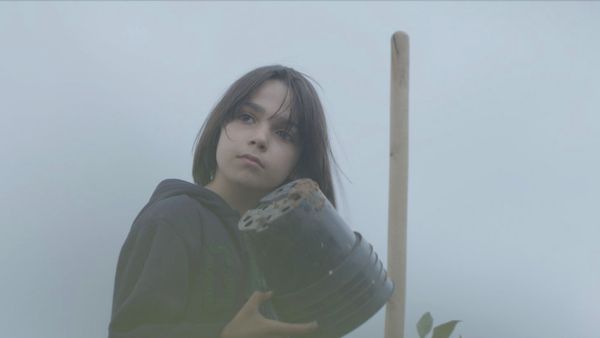Eye For Film >> Movies >> Blueberry Dreams (2024) Film Review
Blueberry Dreams
Reviewed by: Leo Mikaia

It may be good, but is it ethical? Documentaries often tiptoe between considerations of ethics and entertainment in order to keep viewers hooked. A welcome exception is Blueberry Dreams (Lurji Motsvi) by Georgian writer-director Elene Mikaberidze, where such considerations never cross spectators' minds.
With the care and warmth they deserve, the director portrays a family farming blueberries near the border of the occupied region of Abkhazia while keeping the audience fully engaged. How she manages this is a real wonder. The documentary shows how a filmmaker’s genuine connection to the people and the subject-matter of her work reveals the true heart of the story.
Political considerations surrounding the Meladze family are an integral part of Blueberry Dreams. At several points during the 75-minute runtime, billboards advertising bank-loans for agricultural businesses are visible. The state aid program "Plant the Future" is mentioned in passing, and the ongoing war in Ukraine and the Russian occupation of Abkhazia are ever-present topics of conversation. Rising interest rates on the loans and the government's lack of proper guidance reveal a system that leaves people like the Meladzes struggling to succeed.
However, Mikaberidze doesn’t exploit these people to make a bold statement. Instead, she uses the circumstances to offer a deeper understanding of the family and its members. We see everything through the eyes of the father, Soso, mother, Nino, and their kids, Giorgi and Lazare. After spending more than an hour with them, including their happiest and lowest moments, one can’t help but feel like a part of the household.
On the other hand, there are a few scenes that seem staged, included chiefly to shed light on the political situation for foreign audiences who may not be familiar with it. For instance, when Soso and his sons are standing on the blueberry plantation and gazing from afar at the land of Abkhazia; Soso explains in detail to his children what happened during the war and why they can’t go there now. Although this might be necessary, the scene comes across as forced, simplistic, and, most importantly, inauthentic. It feels like the director is also treating the audience like children to whom matters must be spelled out. Thankfully, as the film progresses, those types of scenes appear less and less frequently.
The plantation itself becomes a metaphor for Georgia’s current condition. Neglected by the government, the younger generation feels trapped in their homeland, just like the oldest son Giorgi, who abandons his dreams and decides he wants to become a farmer. He becomes, as someone remarks, a “slave of the plantation." Lazare, the youngest son, has aspirations of becoming a painter. We see an exhibition of his drawings at school; but like many in Georgia's younger generation, even in his artwork he can’t escape the realities of war.
While the story concludes with the family apparently at their lowest ebb, even then, Soso, Nino, Giorgi, and Lazare have hope for a better day. Optimism is the only thing they have left, but the director allows little scope for the viewer to share it.
Reviewed on: 13 Oct 2024















